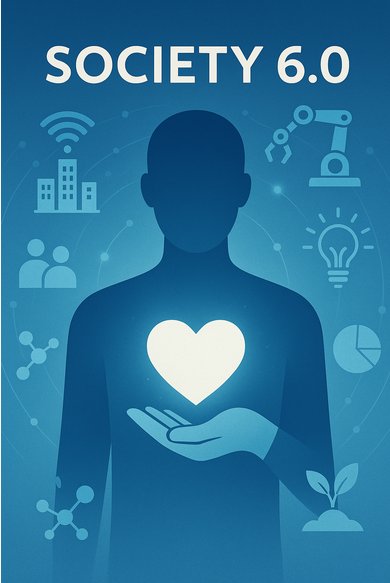Romania
Society 6.0 and Romania’s Democratic Future

Society 6.0: a viable path toward a more just and human centered future or just tech utopia?
In an era marked by transformative technological shifts, the concept of Society 6.0 has emerged as a forward-looking vision of societal evolution. Building on earlier frameworks like Japan’s Society 5.0, which emphasized the fusion of cyberspace and physical space, Society 6.0 takes this integration a step further. It envisions a deeply interconnected, human-centric society shaped by artificial intelligence, decentralized systems, and sustainable innovation—designed not only to optimize efficiency but to enhance human dignity and social cohesion.
At its core, Society 6.0 conceptualizes a harmonious integration of technology, nature, and humanity. It foresees systems where decision-making is increasingly decentralized, automation liberates human potential for more creative endeavors, and sustainable practices are embedded into every layer of society. It raises vital questions about what kind of future societies we wish to build, and how technology can be governed in ways that prioritize human values over technocratic control.
However, the idea remains largely speculative. While it draws from real technological developments—such as AI, blockchain, and smart infrastructure—Society 6.0 is more of a conceptual blueprint than an applied model. The concept challenges existing models by proposing drastic improvements in public administration, education, healthcare, and civic participation—all based on the promise of digital innovation.
Introducing Society 6.0 in Romania
In Romania, discussions about Society 6.0 have begun to take root, reflecting a growing interest in leveraging digital transformation to address longstanding socio-economic challenges. The conversations are emerging in academic circles, government forums and public innovation summits. A notable milestone in this discourse was the recent panel session at the Digital Innovation Summit in Bucharest on April 9, 2025. Titled “Innovation and Digital Transformation – Society 6.0,” the panel was moderated by Cristian David, Coordinator of the Society 6.0 Competence Center at ICI Bucharest.
The panel brought together a diverse group of experts, including Adrian Curaj, General Director of UEFISCDI, who outlined the importance of aligning higher education and research with digital advances; Ryo Taniguchi, Economic Advisor at the Embassy of Japan in Romania, who provided insights from Japan’s Society 5.0 experiences; and Vlad Manoil from The World Bank, who discussed strategies for building robust digital infrastructure. Additional voices such as John Donlon, Christos Kalloniatis, Zlatogor Minchev, and Andrei Rusnac contributed perspectives on infrastructure protection, cultural technology, regional ICT collaboration, and cross-border digital strategies, respectively. This gathering not only elevated the term Society 6.0 on Romania’s public agenda but also demonstrated an institutional willingness to explore the intersection of digital transformation and societal governance.
Where Could Society 6.0 Be Helpful in Romania?
Romania stands at a pivotal point in its democratic and digital development. While the country has made major strides—particularly in the IT sector and digital entrepreneurship—it still faces challenges in public administration, rural development, education, and institutional trust. In this context, Society 6.0 could offer a strategic vision in several key areas:
- Healthcare: AI-assisted diagnostics and telemedicine can improve access, especially in rural areas.
- Smart Villages: Digital infrastructure and decentralized energy systems can rejuvenate underserved communities.
- Education: Personalized learning through AI could bridge the urban-rural divide and stem brain drain.
- Governance: Transparent, digital public services could restore trust and reduce bureaucratic inefficiencies.
Romania stands at a crossroads where its democratic evolution and digital development converge. Since its transition to a pluralistic democracy after the fall of communism, the country has witnessed significant growth in its IT sector, especially in urban centers like Bucharest, Cluj-Napoca, and Timișoara. Yet, challenges such as bureaucratic inefficiencies, urban-rural divides, and public mistrust in institutions persist. Society 6.0 offers a framework that could potentially bridge these gaps. For example, deploying AI-driven public services could streamline administrative procedures and enhance transparency, while decentralized decision-making models using blockchain could reinvigorate civic participation and trust.
Society 6.0 and Liberal Values: Allies or Adversaries?
However, the relationship between Society 6.0 and liberal values introduces a complex debate. The ambitious scope of Society 6.0 naturally intersects with core principles of liberal democracy—with both promising synergies and serious tensions.
On one hand, the integration of digital tools can empower individual citizens by providing them with easier access to information, education, and healthcare. This aligns well with the liberal emphasis on individual rights, freedom, and autonomy. Decentralized technologies may reduce the centralization of power and thus curb the potential for state overreach, contributing to a more participatory form of governance.
On the other hand, there are concerns that such sweeping technological integration could also erode certain liberal ideals. Advanced surveillance systems and data analytics, if not properly regulated, might infringe on individual privacy and civil liberties. Moreover, the risk of algorithmic governance—where decisions are made by opaque computational systems—could result in a loss of accountability and the undermining of democratic processes. The potential for creating a digital divide, where only a tech-savvy elite benefits from rapid innovations, also poses a significant challenge to the liberal ideal of equal opportunity.
The discussions at the Digital Innovation Summit and the Society 6.0 panel have sparked public debate about whether the benefits of digital transformation can be harmonized with democratic values. Panelists stressed the need for a balanced approach that envisions a future where technology does not replace human judgment but rather enhances it. By embedding ethical guidelines, fostering transparency, and ensuring inclusive access to digital innovations, Romania could harness the potential of Society 6.0 in a way that respects and reinforces its liberal democratic foundations.
In conclusion, Society 6.0 remains a speculative yet promising blueprint for the future—one that calls for a bold rethinking of how technology can serve society. In Romania, the dialogue is gaining momentum, fueled by academic inquiry, governmental initiatives and public debate. Whether viewed as an opportunity to leap forward in digital and democratic evolution or as a challenge to traditional liberal values, Society 6.0 is undeniably carving out a place in the public agenda.
